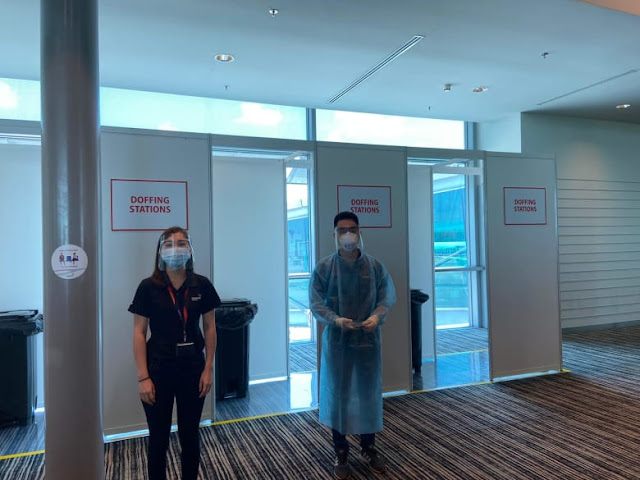Research, editing : Gan Yung Chyan, KUCINTA SETIA
Infections, hospitalizations, and deaths linked to COVID-19 have risen among people who have gotten a COVID-19 vaccine in recent months, according to newly released data from the Centers for Disease Control and Prevention (CDC). But the bulk of cases, hospitalizations, and deaths remained among unvaccinated Americans, the data show.
Cases per 100,000 among the fully vaccinated increased from 12.3 in late June to 121 in mid-August, according to the data. Around the same time, COVID-19-associated hospitalizations in that population rose from 8.9 per 100,000 to 75 and COVID-19 deaths jumped from 0.1 per 100,000 to 1.1.
A stream of studies in recent months have indicated that COVID-19 vaccine effectiveness is waning, especially against infection from the CCP (Chinese Communist Party) virus, which causes COVID-19. The CDC data, gathered from surveillance systems in states and hospitals, provides another source verifying a drop in protection.
“The marked pronounced change in vaccine effectiveness is likely due to emergence of the Delta variant as the dominant variant, and the waning of vaccine immunity over time,” Paul Alexander, a former Trump administration COVID-19 adviser who has a masters of science in clinical epidemiology and community health, told The Epoch Times in an email.
“The immunity from the vaccine drops markedly over the few months post vaccine. The Delta is more infectious (yet far less lethal) but the real issue is that there is a mismatch as the vaccine does not hit the Delta so there is immune escape. It has effectively failed against the Delta and the accumulated evidence shows this (UK, Israel, etc.). So once infections rise, there is usually a hospitalization curve and then a death curve that follows,” he added.
Scientists often refer to cases, hospitalizations, or deaths that occur in the fully vaccinated as “breakthroughs.” None of the vaccines are 100 percent effective, and all of them have declined in effectiveness over time, according to studies and clinical data. The decline has largely matched the introduction and quick dominance of the CCP virus’ Delta variant.
A breakdown of the CDC’s data by age showed cases, hospitalizations, and deaths in the vaccinated increased across all age groups.
Officials in Maryland, which contributed data on cases and deaths, said they’ve seen an increase in deaths attributed to COVID-19 among the vaccinated.
Of the 190 deaths among confirmed COVID-19 cases between Sept. 16 and Oct. 18 in the state, 32 percent were fully vaccinated people, Andy Owen, deputy director for media relations for the Maryland Department of Health, told The Epoch Times in an email.
“Many of these deaths are linked to comorbidities that make patients more vulnerable. This further underscores our mission to maintain immunity by urging all eligible Marylanders to get their booster shots. Keep in mind that as the number of our residents who are vaccinated continues to increase, we expect to see an increase in the proportion of COVID-related deaths occurring in vaccinated individuals,” he said.
Still, just 295 of the nearly 4 million Marylanders who have been fully vaccinated have died of COVID-19, officials in the state said. That’s less than one-hundredth of a percent.
The waning effectiveness of vaccines recently drove drug regulators and the CDC to authorize and recommend booster shots for millions of Americans, including everybody who got the single-shot Johnson & Johnson vaccine.
Boosters are needed to generate long-lived immunity with virtually every non-live vaccine, including polio and hepatitis A shots, said Dr. David Boulware, professor of medicine at the University of Minnesota’s Division of Infectious Diseases and International Medicine.
“Thus, needing a booster was an expectation for most immunologists, infectious disease physicians, and/or pediatricians familiar with vaccines. The only question was when?” he told The Epoch Times in an email.
While data show antibodies from the vaccines are decreasing over time, memory B cells are retained, which help the human body respond rapidly to infections. However, the Delta variant brought shorter incubation periods, highlighting a need for a larger population of the B cells.
“This is achieved with a booster, which is why boosters are beneficial at >6 months. With boosters, I (and others) expect vaccine breakthrough infections to greatly decrease, and the emerging data support this,” Boulware said.
The data on breakthrough metrics showed a slight drop in breakthrough cases near the end of August.
The bulk of the infections, hospitalizations, and deaths were found to be among the unvaccinated, or people who had no verification of having received a COVID-19 vaccine, according to the CDC. The agency said the data showed an unvaccinated person in August had a 6.1 times greater risk of testing positive for COVID-19 and an 11.3 percent great risk of dying from COVID-19.
Metrics among the unvaccinated did rise across age groups but the data illustrated how younger, healthy people are at little risk from the disease. Unvaccinated 18- to 29-year-olds saw deaths lower than most fully vaccinated age groups, and the death rate for unvaccinated 30- to 49-year-olds was well below that of fully vaccinated people 80 or older and close to that of fully vaccinated 65- to 79-year-olds.
Most of the deaths were among unvaccinated people 65 or older.
News (5)
FDA authorizes Pfizer covi vaccine for emergency use in children aged 5 to 11
The Food and Drug Administration (FDA) on Friday issued an emergency authorization to use Pfizer’s COVID-19 vaccine in children aged 5 through 11, coming days after an advisory panel recommended it.
But before the shots can be distributed across the United States, the Centers for Disease Control and Prevention (CDC) must first sign off on the move.
“As a mother and a physician, I know that parents, caregivers, school staff, and children have been waiting for today’s authorization. Vaccinating younger children against COVID-19 will bring us closer to returning to a sense of normalcy,” acting FDA Commissioner Dr. Janet Woodcock said in a statement Friday.
The FDA’s Vaccines and Related Biological Products Advisory Committee voted overwhelmingly to back a smaller dose of the Pfizer-BioNTech mRNA vaccine for younger children. Children aged 12 and older have been eligible to get the vaccine for months.
In a news release, the FDA said that immune responses in younger children were similar to individuals aged 16 to 25. Based on an ongoing study from the agency, the FDA said that the vaccine was 90.7 percent effective in preventing COVID-19 in kids aged 5 to 11.
About 3,100 children in that age group have not displayed serious side effects in the ongoing study, the agency continued.
“The FDA has determined this Pfizer vaccine has met the criteria for emergency use authorization,” it said. “Based on the totality of scientific evidence available, the known and potential benefits of the Pfizer-BioNTech COVID-19 vaccine in individuals down to 5 years of age outweigh the known and potential risks.”
A news release issued by the FDA said that the agency’s and CDC’s surveillance systems identified higher risks of myocarditis—inflammation of the heart muscle—and pericarditis—inflammation of the tissue surrounding the heart—after males aged 12 to 17 got the Pfizer vaccine.
Based on its own modeling to ascertain the risk-benefit ratio for children aged 5 to 11, the FDA “predicts that overall, the benefits of the vaccine would outweigh its risks in children 5 through 11 years of age.”
Other than heart inflammation, other side effects include headache, fatigue, fever, chills, swollen lymph nodes, loss of appetite, nausea, and a sore arm, the health agency said.
“More children reported side effects after the second dose than after the first dose,” according to the release. “Side effects were generally mild to moderate in severity and occurred within two days after vaccination, and most went away within one to two days.”
The CDC’s Advisory Committee on Immunization Practices will meet next week to discuss the vaccine. Depending on the outcome of the panel’s meeting, CDC Director Rochelle Walensky would then have the final say on when the vaccine can be used for younger children, and also in what circumstances.
Dr. Michael Kurilla, an expert on infectious diseases and pathology who directs a division inside the National Institutes of Health, was the only official on the FDA advisory panel who didn’t support the recommendation earlier this week.
“Because the Pfizer vaccine offers protection against serious disease even after antibody titers have waned, there is some other basis for immunity, but at the lower dose in children, there is no expectation that those same immune processes will behave similarly to the higher adult dose,” he told The Epoch Times.
It came just days after Harvard University professor of medicine Martin Kulldorff told EpochTV’s “American Thought Leaders” program that he believes children should not get the COVID-19 vaccine.
“I don’t think children should be vaccinated for COVID. I’m a huge fan of vaccinating children for measles, for mumps, for polio, for rotavirus, and many other diseases, that’s critical. But COVID is not a huge threat to children,” said Kulldorff, who has often criticized the federal government’s vaccine mandates on social media.
In the interview earlier this week, Kulldorf pointed to data showing that children have a very low chance of hospitalization, death, or long-term effects from COVID-19.
Children, he added, “can be infected, just like they can get the common cold, but they’re not a big threat. They don’t die from this, except in very rare circumstances. So if you want to talk about protecting children or keeping children safe, I think we can talk about traffic accidents, for example, which they are really at some risk.”
When the vaccines are rolled out for younger children, there is sure to be parental resistance nationwide.
Earlier this week, a poll carried out by the Kaiser Family Foundation discovered that 30 percent of parents said they “will definitely not get the vaccine” for their 5- to 11-year-old. Five percent said they would have their kids get the vaccine only if it was required to attend school, it found.
About 27 percent said they definitely would have their child receive the shot, Kaiser said. Another 33 percent of parents said they would wait and see.
“Parents’ main concerns when it comes to vaccinating their younger children ages 5-11 have to do with potential unknown long-term effects and serious side effects of the vaccine, including two-thirds who are concerned the vaccine may affect their child’s future fertility,” the pollsters wrote.





























































